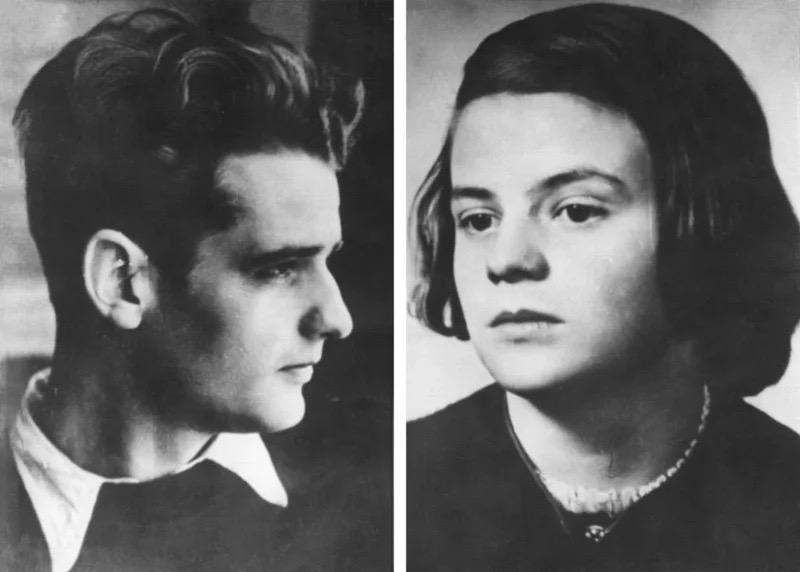
I was the youngest among my third-grade classmates. I took an intelligence test—they skipped the emotional viability test—to wheedle into this advanced placement. My parents mistakenly thought this was a good idea. That’s a grievance to air another day.
“We are your bad conscience,” said one of the leaflets. “Everyone wants to exonerate himself from his share of the blame … But it cannot be done: everyone is guilty! guilty! guilty!”"
For today I’ll stick to my lifelong distrust of enforced uniformity, and where it can lead in the extreme case.
Some boys in my third-grade class were old enough to join a cub scout den. I don’t know the criteria for age eligibility. I assume the mothers who organized the den adopted the rule in accordance with scouting by-laws, and the age of their sons. I do not assume a conspiracy against me, although that would explain some things.
The boys who became scouts came to school on den-meeting days dressed in snappy blue shirts and yellow neckerchiefs, parading their medals, stripes, badges and (do I embellish?) swagger. Yes, I was envious. This was my first brush with an exclusionary secret society, or perhaps the first time the exclusion bit me.
I became a cub scout the next school year, but it was too late to matter. I didn’t wear my uniform to school. I was otherwise not a good scout. Earning medals? What did that have to do with getting admitted to Harvard? Although on this point I may be mind-merging with my lukewarm performance at Hebrew School.
Scout’s honor? I’m too cynical to entertain the thought. In retrospect, it certainly could have been life enhancing to emerge from the braces of childhood with a few jamborees under my belt, some outdoor skills, some codes of character not tainted by hypocrisy, self-righteousness, groupthink, tribalism, loyalty oaths, but, you know, you play the cards you’re dealt. Bitch later, when looking back through the kaleidoscope of time, recording the retrospective narrative that stumbles out like a war refugee, a survivor.
Scout Oath: On my honor I will do my best to do my duty to God and my country and to obey the Scout Law; to help other people at all times; to keep myself physically strong, mentally awake, and morally straight.
The Twelve Points of Scout Law: Trustworthy. Loyal. Helpful. Friendly. Courteous. Kind. Obedient. Cheerful. Thrifty. Brave. Clean. Reverent.
Material—pictures and commentary—from a Time Magazine article on the internet entitled, “The History Behind Jojo Rabbit and What It Was Really Like to Be in the Hitler Youth”.
“At the same time, despite the mandatory nature of participation, the history of Nazi youth organizations does contain examples of resistance.
The most famous resisters were Hans and Sophie Scholl, a brother and sister who were executed by guillotine on Feb. 22, 1943, for distributing anti-Nazi leaflets through their underground resistance group at the University of Munich after learning about what was happening at the Dachau concentration camp. Hans and Sophie were 24 and 21 years old, respectively — not children, but…young enough that they “were reared under Hitler’s National Socialism, drilled in its rituals, supposedly imbued with its doctrines.”
“We are your bad conscience,” said one of the leaflets. “Everyone wants to exonerate himself from his share of the blame … But it cannot be done: everyone is guilty! guilty! guilty!””
Here is what I said about myself on the back page of my 2020 humor/drama/politico novel "The Debutante (and the Bomb Factory)" (edited here, for clarity):
"Jonathan Canter Is a retIred attorney; widower; devoted father and grandfather (sounds like my obit); lifelong resident of Greater Boston; graduate of Harvard College (where he was an editor of The Harvard Lampoon); fan of waves and wolves; sporadic writer of dry and sometimes dark humor (see "Lucky Leonardo" (Sourcebooks, 2004), funny to the edge of tears); gamesman (see "A Crapshooter’s Companion"(2019), existential thriller and life manual); and part-time student of various ephemeral things."
The Deb and Lucky are available on Amazon. The Crapshooter is available by request to the author in exchange for a dinner invitation.


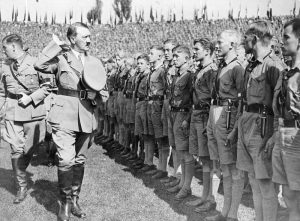
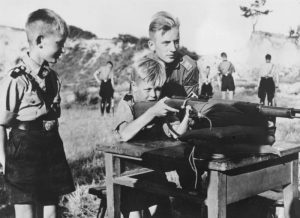
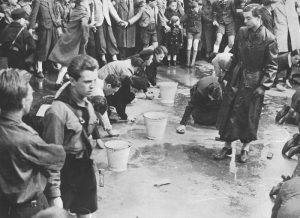
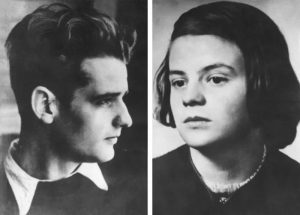

Very poignant and disturbing story, Jon. As in my recollection, the Hitler Youth image was an issue, in my case for my mother, when my brother’s cub scout troop marched. Sobering indeed.
Marian,
I think that the brother and sister who resisted the Nazis, and were guillotined, are noble examples of human strength and resistance to evil.
Jon
Yes, thank you for your comment. The past is with us in the present, sometimes with sweet stories of Girl Scout cookies, sometimes with a darker voice.
Interesting read, Jonathan. There was a lot of variation in the different dens and troops, as I recall. I lasted for a few years, but decided to follow my own drumbeat instead.
I agree, many different dens and troops, and likely many beneficial contributions.
Enforced uniformity goes wrong fast and frequently.
My grade school had something called “Patrol Boys.” Yes, boys only. Their ostensible task was to act as auxiliary street crossing guards. They were run by the boys gym teacher, Mr. Louis (A true piece of work. See my story “Mostly Tricks”). When they were given the task of enforcing schoolyard rules, they mutated into our playground Brownshirts, bullying and extorting snacks and money from the rest. If you refused, they would haul you off to a teacher, the principal or Mr. Louis on a made-up rules violation. The accused was NEVER believed; Mr. Louis’ darlings could do no wrong.
God, I HATED the Patrol Boys.
Dave, I join you in hating the Patrol Boys. It reads like the script of Lord of the Flies.
Jon, I too thought of Marian’s story and her mother’s dislike of Cub Scouting because it reminded her of the Hitler Youth.
My own memories of my few grade school years as a Girl Scout were carefree, certainly not militaristic, quite different from what we know about the BSA..
It might be a kinder and gentler world if more women ran the show.
Yes, I share Marian’s mother’s concerns about the blood and soil themes that emerge in scouting. In my piece I tried to identify the fascism of Hitler Youth as the extreme case, and from what I surmise many boys and girls reaped solid benefits from American scouting (myself not among them).
Jon, as soon as I read that you had skipped an elementary school grade, I just wanted to hug you and scream, “Me too”. I understand that psychology all too well (I’ve written that about that trauma for Retro, though I’d have to do too much digging right now to unearth the exact prompt; I think one was “Betrayal”). We moved from Detroit to a neighboring suburb when I was half-way through 5th grade (even in the late ’50s, the Detroit school system was overcrowded and had a weird way to enroll students). So I skipped the second half of 5th grade, being tutored in long division over the summer, arriving at a K-6 school as a 6th grader in the fall of 1963. Like you, I was the youngest in the class, small, undeveloped (many of the girls were on the cusp of puberty). I wore glasses, had teeth that stuck out, but was still among the smartest in the class. We had learned “new math” in 5th grade. They hadn’t learned it yet. I was painfully shy and was isolated and despised by these girls who were cliquish and sophisticated (they dressed differently, had different hair styles, they were just plain mean to me).
Even though I went to the same temple as a few of these kids, I skipped the grade there too, so was thrown in with them on Sundays as well, and was now part of Junior Choir, where at least I got solos. I didn’t go to Hebrew School on weekdays. Girls were not yet bat mitzvahed in those years. But, like you, I was not part of any club (these girls didn’t do scouting, they were too cool for that). It was only when I got to the National Music Camp in Interlochen, MI the next summer that I found a peer group that has lasted a lifetime for me.
Betsy, my father (H ’35) skipped one (possibly two) grades. This is reflective I think of a set of immigrant priorities, which were narrowly focused on taking quick advantage of the new secular freedoms and opportunities available in America, but were not versed in the culture of the indigenous (ie, WASP) hegemony (that is a bigger subject than I can tackle in this quick note). I note that when I went to (an elite, WASPY) prep school) and repeated 8th grade, I was still young for the group, there being a what’s-the-hurry, older-is-better approach in the hegemonic class.
This is a very thoughtful take on the militaristic side of scouting, Jon. I thought JoJo Rabbit was an important movie and I’m sorry it wasn’t seen by more people. We are now learning the painful consequences of resistance once again in Ukraine.
Your “lifelong distrust of enforced uniformity” strikes me as extremely sane. I repeat the comment I made to one of the other stories on this prompt about the guy who was called up by the selective service and was asked if he had belonged to any other military or paramilitary organizations, and he answered yes–the Boy Scouts. Albeit not all scouting experiences were objectionable, there is that underlying element of machismo, hierarchy and war that threatens.